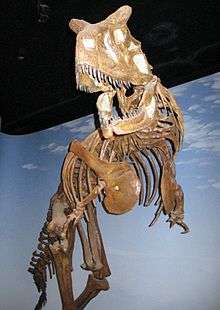La Colonia Formation
| La Colonia Formation Stratigraphic range: Maastrichtian | |
|---|---|
| Type | Geological formation |
| Overlies | Cerro Barcino Formation |
| Location | |
| Region | Chubut Province |
| Country |
|
The La Colonia Formation is a geological formation in Argentina whose strata date back to the Late Cretaceous. Dinosaur remains are among the fossils that have been recovered from the formation.[1]
Originally thought to be Campanian in age or earlier, studies of underlying formations have made a Maastrichtian (70–66 million years ago) age more likely.[2]
Flora
The paleoflora was known for its aquatic components, Paleoazolla and Regnellidium.[3] However, recent paleobotanical discoveries at the Cañadón del Irupé locality have revealed the presence of a more diverse range of plants associated with these water bodies, including pteridophytes, gymnosperms, and various angiosperms.[3] Among these are fossil leaves and fruits assignable to Nelumbonaceae.[3]
Fauna
Turtles
| Turtles reported from the La Colonia Formation | ||||||
|---|---|---|---|---|---|---|
| Genus | Species | Location | Stratigraphic position | Material | Notes | Images |
|
P. gasparinae |
"skull fragments and several postcranial elements including a nearly complete vertebral column."[4] |
|||||
Mammals
Over 300 mammal specimens have been found in the La Colonia Formation.[5]
| Mammals of the La Colonia Formation | ||||
|---|---|---|---|---|
| Taxa | Presence | Notes | Images | |
|
A possible gondwanatherian or multituberculate. |
||||
Dinosaurs
| Dinosaurs reported from the La Colonia Formation | ||||||
|---|---|---|---|---|---|---|
| Genus | Species | Location | Stratigraphic position | Material | Notes | Images |
|
C. sastrei[7] |
"Nearly complete skeleton and skull."[8] |
An abelisaurid. |
| |||
|
Hadrosauridae indet. |
Indeterminate |
An indeterminate hadrosaurid. | ||||
See also
References
- ↑ Weishampel, David B; et al. (2004). "Dinosaur distribution (Late Cretaceous, South America)." In: Weishampel, David B.; Dodson, Peter; and Osmólska, Halszka (eds.): The Dinosauria, 2nd, Berkeley: University of California Press. Pp. 600-604. ISBN 0-520-24209-2.
- ↑ Rauhut, O.W.M.; Cladera, G.; Vickers-Rich, P.; Rich, T.H. (2003). "Dinosaur remains from the Lower Cretaceous of the Chubut Group, Argentina". Cretaceous Research. 24 (5): 487–497. doi:10.1016/S0195-6671(03)00067-3.
- 1 2 3 Gandolfo, Maria A.; Ruben N. Cuneo (February 2005). "Fossil Nelumbonaceae from the La Colonia Formation (Campanian–Maastrichtian, Upper Cretaceous), Chubut, Patagonia, Argentina". Review of Palaeobotany and Palynology. 133 (3–4): 170. ISSN 0034-6667. doi:10.1016/j.revpalbo.2004.09.007.
- ↑ Juliana Sterli and Marcelo S. De la Fuente (2011). "A new turtle from the La Colonia Formation (Campanian–Maastrichtian), Patagonia, Argentina, with remarks on the evolution of the vertebral column in turtles". Palaeontology 54 (1): 63–78. doi:10.1111/j.1475-4983.2010.01002.x.
- ↑ Rougier, G.W.; Chornogubsky, L.; Casadio, S.; Arango, N.P.; Giallombardo, A. (2009). "Mammals from the Allen Formation, Late Cretaceous, Argentina". Cretaceous Research. 30 (1): 223–238. doi:10.1016/j.cretres.2008.07.006.
- ↑ Rauhut, O.W.M. (2004). "Provenance and anatomy of Genyodectes serus, a large-toothed ceratosaur (Dinosauria: Theropoda) from Patagonia". Journal of Vertebrate Paleontology. 24 (4): 894–902. doi:10.1671/0272-4634(2004)024[0894:PAAOGS]2.0.CO;2.
- ↑ Leanza, H. A., Apesteguı́a, S., Novas, F. E., & de la Fuente, M. S. (2004). Cretaceous terrestrial beds from the Neuquén Basin (Argentina) and their tetrapod assemblages. Cretaceous Research, 25(1), 61-87.
- ↑ "Table 3.1," in Weishampel, et al. (2004). Page 49.
